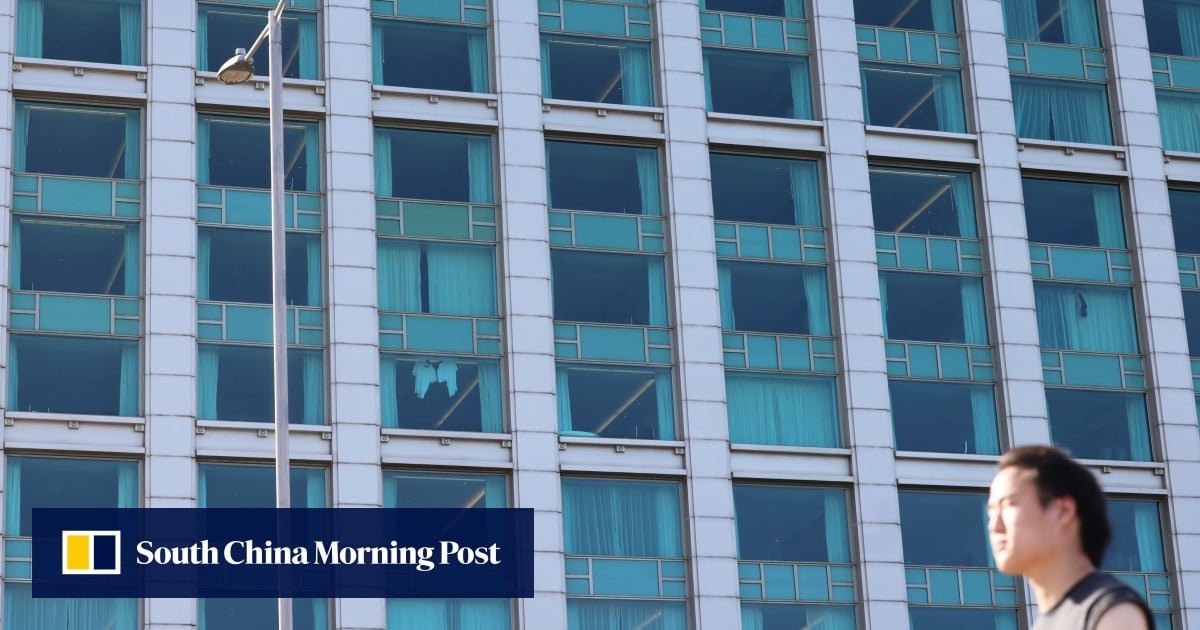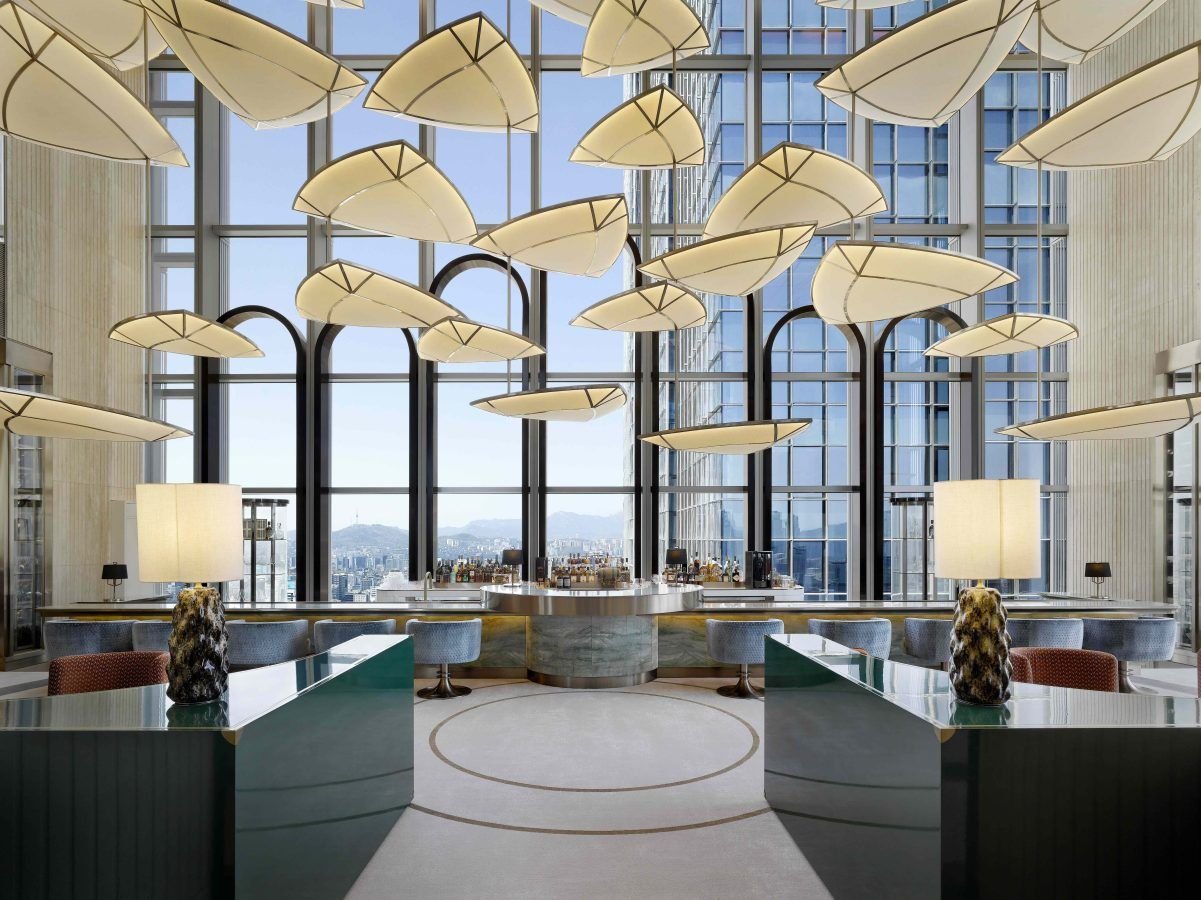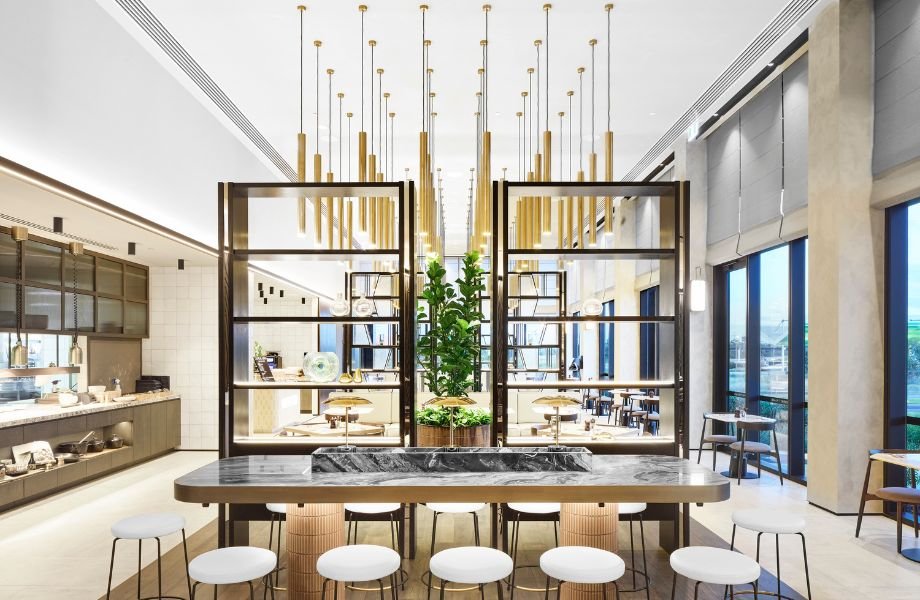Hotels & Accommodations
Mainland Chinese hotel brands poised to reshape Hong Kong’s hospitality scene, analysts say

Currently, Western and international operators dominate Hong Kong’s hotel landscape, while Chinese ones have a minor presence. Among some of the more notable mainland players, BTG Homeinns operates both upscale and mid-market hotels in Hong Kong, including the Wharney Hotel in Wan Chai, Oasis Avenue in Tsim Sha Tsui, and Oasis Aurum 181 in Sai Ying Pun.
However, mainland brands had significant potential for growth, said Hannah Jeong, executive director and head of valuation and advisory services at CBRE Hong Kong.
“The Chinese operators are increasing their footprint and it’s a global trend,” said Jeong, adding that because 70 per cent of tourists in Hong Kong came from the mainland, Chinese hotels “must show their presence” in the city.
The shift reflects the growing ambition of Chinese hotel operators to expand beyond the mainland, which could give them a competitive edge in attracting hotel asset owners, according to CBRE.
Hotel operations typically follow several business models, such as a master lease – where the hotel owner leases the asset to an operator – or hotel service management, whereby the operator manages the hotel on behalf of the owner.
Hotels & Accommodations
The Secret AI Agent Revolution: How Hotels Are Unlocking $500K+ Annual Revenue Through Invisible Intelligence

What if I told you that while you’re reading this, a handful of hotels worldwide are secretly deploying AI agents so advanced they’re generating additional revenue streams that didn’t exist 12 months ago? What if these same hotels are using technology so sophisticated it makes Siri look like a calculator?
The hospitality industry stands at the precipice of the most dramatic transformation since the internet changed how we book rooms. But this isn’t about chatbots answering “What time is breakfast?” This is about AI agents so intelligent they’re redefining what it means to be “ready” for the future.
The $2.4 Trillion Question Every Hotel Owner Must Answer
Here’s a number that should terrify and excite you simultaneously: $2.4 trillion. That’s the projected value of AI in the hospitality sector by 2030. But here’s the twist: only 12% of hotels worldwide are currently positioned to capture even a fraction of this unprecedented wealth transfer.
The question isn’t whether AI will transform your hotel. The question is whether your hotel will be among the winners or the casualties.
The Invisible Revolution: Meet Your Future AI Operating System
Imagine walking into a hotel where every surface, every interaction, every moment is orchestrated by an invisible intelligence network. Not the clunky, robotic AI you’ve experienced before, but something so seamless it feels like magic.
This isn’t science fiction. It’s happening right now in select properties that have cracked the code on AI readiness.
The Guest Who Never Existed (But generated $50,000 in Revenue)
Consider the story of the Meridian Boutique Hotel in Switzerland, a 47-room property that recently discovered something extraordinary. Their AI agent identified a guest preference pattern so subtle that no human could have detected it. By analyzing micro-behaviors across 10,000+ previous guests, the AI discovered that travelers who book corner rooms on Wednesdays and order room service between 8:47 PM and 9:15 PM have a 340% higher likelihood of extending their stay if offered a specific type of local experience.
The AI didn’t just identify this pattern; it created an entirely new revenue stream. Within six months, these “invisible insights” generated an additional $50,000 in revenue from guests who would have otherwise checked out as planned.
But here’s where it gets interesting: the hotel’s management had no idea this pattern existed until their AI agent revealed it.
The Four Pillars of AI Readiness (And Why Most Hotels Are Building on Quicksand)
Pillar 1: Operational Intelligence That Thinks 10 Steps Ahead
Traditional hotel management operates on reactive intelligence: problems happen, then humans solve them. AI-ready hotels operate on predictive intelligence: problems are solved before they occur, often without human intervention.
The Maintenance Revolution
At the Grand Vista Resort, their AI agent monitors 847 different data points across their property every 3.2 seconds. Last month, the system detected an imperceptible vibration pattern in elevator #3 that indicated a component failure would occur in 11 days. The repair was scheduled during a low-occupancy period, preventing a breakdown that would have stranded guests and cost $47,000 in emergency repairs and lost bookings.
But that’s just the beginning. The same AI agent simultaneously:
- Predicted optimal housekeeping routes that reduced cleaning time by 23%
- Identified energy consumption patterns that cut utility costs by $3,200 monthly
- Detected guest behavior patterns that increased spa bookings by 156%
Pillar 2: Guest Experience Orchestration (The $100 Million Secret)
Here’s something the big hotel chains don’t want you to know: the difference between a satisfied guest and a loyal guest is often measured in micro-moments of delight that most properties miss entirely.
AI-ready hotels don’t just collect guest data; they create guest destinies.
The Case of the Crying Child
At a family resort in Costa Rica, an AI agent analyzed audio patterns and identified a distressed child in room 247 at 2:17 AM. Instead of waiting for a noise complaint, the AI immediately:
- Cross-referenced the family’s profile (parents with an 18-month-old)
- Identified the likely cause (travel fatigue and schedule disruption)
- Automatically arranged for a complimentary care package delivery within 8 minutes
- Included a personalized note with local parenting tips and a small comfort toy
The family’s stay transformed from potential disaster to their “most memorable vacation ever.” They’ve returned twice, spending $18,000 in total, and referred to four other families. The AI’s intervention cost $23.
This is the power of predictive hospitality, solving problems that guests don’t even know they have.
Pillar 3: Revenue Optimization Through Invisible Intelligence
Traditional revenue management looks at historical data and makes educated guesses. AI-ready hotels look into the future and make precision strikes.
The Thursday Night Phenomenon
A 95-room boutique hotel in Prague discovered something extraordinary when it achieved true AI readiness. Their agent identified that Thursday night bookings made 347 days in advance by guests aged 28-34 who browse their website for more than 4.3 minutes have an 89% probability of upgrading to premium suites if offered a personalized experience package exactly 72 hours before arrival.
This insight alone generated $127,000 in additional annual revenue from a guest segment that previously went completely unnoticed.
But the AI didn’t stop there. It created dynamic pricing models that:
- Increased ADR by 34% without reducing occupancy
- Identified optimal upselling moments with 91% accuracy
- Generated $340,000 in incremental F&B revenue through personalized dining recommendations
Pillar 4: Competitive Intelligence That Borders on Mind Reading
AI-ready hotels don’t just compete—they dominate through information asymmetry.
The Secret Shopper Revolution
While competitors guess what guests want, AI-ready properties know exactly what their competitors are doing wrong. Advanced AI agents can analyze competitor pricing, service gaps, and guest sentiment in real-time, creating opportunities that feel almost unfair.
One property in Miami increased its market share by 27% in eight months by deploying an AI agent that identified when competitors were experiencing service issues, automatically adjusting marketing and pricing to capture displaced demand.
The Hidden Cost of AI Unreadiness (It’s More Terrifying Than You Think)
Here’s what keeps hotel owners awake at 3 AM: the opportunity cost of inaction.
While you’re reading this article, AI-ready hotels are:
- Capturing guest data that will give them competitive advantages for decades
- Building operational efficiencies that reduce costs by 15-40%
- Creating personalized experiences that turn guests into evangelists
- Generating revenue streams that didn’t exist 24 months ago
Every day you delay AI readiness is a day your competitors get further ahead. And unlike traditional competitive advantages, AI advantages compound exponentially.
The Compounding Effect
An AI agent gets smarter with every interaction. A hotel that starts its AI journey today will have a system that’s 10x more intelligent in 12 months. A hotel that waits 12 months to start will never catch up; they’ll be competing with yesterday’s technology against tomorrow’s intelligence.
The Three Critical Questions Every Hotel Owner Must Ask
Before any hotel can begin its AI transformation, it must honestly assess its current position. Here are the three questions that separate the AI-ready from the AI-hopeful:
Question 1: “Do you know what you don’t know about your guests?”
Most hotels collect data but don’t generate intelligence. AI-ready properties understand that every guest interaction contains predictive signals about future behavior, spending patterns, and lifetime value. The hotels winning the AI revolution have learned to decode these signals.
Question 2: “Can your property predict and prevent problems before they occur?”
Reactive management is dying. AI-ready hotels operate with predictive precision; they know when equipment will fail, when guests will be dissatisfied, and when revenue opportunities will emerge. If your hotel is still playing catch-up instead of staying ahead, you’re already falling behind.
Question 3: “Are you building competitive advantages or competitive vulnerabilities?”
Every day without AI readiness is a day your competitors gather intelligence you’ll never recover. The data being collected today will power the AI systems of tomorrow. Hotels that start this journey immediately will have insurmountable advantages over those who wait.
The Secret That’s Changing Everything
Here’s what the hospitality industry’s early AI adopters discovered: transformation doesn’t require a complete technology overhaul. It starts with understanding exactly where you stand and what’s immediately possible.
The most successful AI implementations began with a simple realization: readiness isn’t about having the perfect technology; it’s about having the perfect strategy.
Your Next Step into the Future
The hospitality industry is experiencing its most significant evolution in history. AI-ready hotels are generating millions in additional revenue, creating unparalleled guest experiences, and building competitive systems that will protect them for decades.
The transformation begins with understanding your current AI readiness and discovering the specific opportunities within your property.
The Revolution Is Now
Here’s the reality: while you’ve been reading this article, AI-ready hotels have processed thousands of guest interactions, identified dozens of revenue opportunities, and strengthened their competitive positions.
The question isn’t whether this transformation will happen; it’s already happening.
The question is whether you’ll be leading it or watching it pass you by.
Ready to begin your AI transformation?
The journey to AI readiness starts with understanding where you stand today and what’s possible tomorrow. Smart hotel owners are already taking the first step by connecting with AI transformation specialists who can provide immediate insights and actionable strategies.
Because in the race for hospitality’s future, being curious isn’t enough. You need to be committed.
The Window Is Closing
Every month that passes, the gap between AI-ready hotels and traditional properties grows wider. The early adopters aren’t just implementing technology; they’re redefining what hospitality means in the digital age.
The hotels that begin their AI journey today will have 12 months of intelligence gathering and system optimization before their slower competitors even start. That’s not just a head start, it’s a permanent advantage.
The hospitality revolution is here. The AI-ready hotels are already winning.
The only question is: when will you join them?
The future belongs to the prepared. In hospitality’s AI revolution, preparation begins with a single conversation about your property’s potential.
Ready to discover what AI readiness could mean for your hotel? The transformation specialists who are helping properties worldwide unlock their AI potential are standing by to show you exactly what’s possible.
Because the hotels that hesitate won’t just miss opportunities, they’ll become the cautionary tales of the AI era.
Start your AI readiness journey today. Your future guests and your bottom line will thank you.
👉 Next Steps
Comment below: Which persona sounds most like your property?
The future of hotels isn’t about flashy gadgets; it’s about embedding intelligence into your very DNA. Dive below the surface and discover the hidden engine that will reinvent everything you thought you knew about hospitality.
See you beneath the waves!
And if you’re ready to take the first step, I invite you to join me for a complimentary 60-minute Hotel AI Consultation. Together, we’ll unlock what AI can do for your brand. Send me a DM on LinkedIn to learn more.
Ready to Transform Your Hotel? Discover how AI and innovative education can redefine hospitality. Let’s start the conversation!
Contact me today to discuss how we can leverage your hotel’s AI, social media, and creative content to revolutionize your hotel and create a truly unique and unforgettable guest experience.
This collaboration will allow us to:
- Assess your specific needs and goals: We’ll work together to identify the key areas where AI can make the biggest impact on your business.
- Develop customized AI agent personas: We’ll craft AI agents that embody your brand and resonate with your target audience.
- Implement and integrate AI solutions: We’ll seamlessly integrate AI into your existing systems and workflows, ensuring a smooth transition and minimal disruption.
- Provide ongoing support and optimization: We’ll continuously monitor and refine your AI agents to ensure they’re delivering exceptional results.
By partnering together, we can create a truly exceptional hospitality culture where AI and humans thrive together and provide a thrilling experience for everyone involved. Let’s shape the future of hospitality together.
Hotels & Accommodations
T+L Review: Josun Palace, Seoul

Give Us the Skinny
The Chosun Hotel, which opened in 1914, was one of Korea’s first luxury hotels. Occupying the same site is its modern reincarnation, Josun Palace, which opened quietly during the pandemic in 2021 and is now laying claim to be the best hotel in Seoul. Part of Marriott’s Luxury Collection, the hotel is housed on the middle floors of a gleaming glass-and-steel high-rise development, Centerfield Mall.
The Vibe
A large sculpture of a decaying biblical figure, Moses, by star contemporary artist Daniel Arsham in the lobby area shows that the hotel isn’t just grand, it’s on-trend too. Interiors, by Monaco-based architectural practice Humbert & Poyet, are highly Instagrammable, with Art Deco, Modernist and Korean design elements creating an eye-catching whole. The Grand Reception room on the 25th floor is one of the smartest check-in areas of any city hotel.
The Location
Conveniently located in the swanky Gangnam district, home to many of Seoul’s best restaurants, bars and shops. Gangnam is a big district, however, and the hotel is in the business precinct, with most of those happening venues still a taxi ride away rather than walking distance. Note that the hotel entrance, via a basement carpark, can be tricky to find.
The Crowd
As a prestige address, the hotel draws a mix of predominantly Korean and some international business executives alongside well-heeled, well-dressed leisure travelers, including couples and families.
The Rooms
The 254 light and airy rooms and suites are located between floors 27 to 35 of the building, offering terrific views of the sprawling Korean capital through floor-to-ceiling windows. Each is dressed in soothing neutral hues and perked up with touches of sage green, mustard, or geometric-print upholstery. Curves and rounded edges on headboards, bedside tables, armchairs, and in the marble bathroom contribute to a relaxing mood.
My open-plan Masters Suite had a corner sofa, separate dining table and work desk, and walk-in wardrobe. My favorite feature however, was the Samsung AirDresser, installed in all rooms. What looks like a fridge is actually a steam cleaner for your clothes. After a day out and about, or a night of Korean barbecue, just pop your clothes into the unit for a clean and refresh—genius!
The Food and Drink
Michelin-starred Eatanic Garden is a destination on its own. Located on the hotel’s top floor, the botanic-inspired interiors and stunning city views (couples should request window tables) are a feast for the eyes, as is chef Son Jong-won’s contemporary Korean cuisine. The tasting menu changes seasonally and each course is accompanied by an illustrated explanation card.
Also on this level is Cantonese fine-diner The Great Hong Yuan, with equally striking interiors and views. A waiter recommended a soup with bamboo shoot and “delicacy of the sea”. I made the mistake of not checking what it was: a euphemism for shark’s fin. If in doubt, ask, though note that staff speak limited English.
Breakfast in high-ceilinged Constans is a great way to start the day. The extensive buffet includes quality fruits, steaming baskets of dumplings (love the kimchi dumplings), noodles made to order and classics like eggs benedict. On weekends, breakfast is in two sittings and ends early, at 10 am (as it does every day). Meanwhile, 1914 Lounge & Bar, named in honor of the original hotel, is good for afternoon tea, cocktails and nightcaps under dramatic nine-meter-high ceilings. Be aware that a cover charge applies for window seats.
The Gym
Although I didn’t get to use the gym, I’m told that oxygen levels are regulated to help you get the most out of your workout while using state-of-the-art Technogym equipment. I wish I had more time to use the excellent steam and sauna facilities, which includes hot and cold plunge pools. The photogenic 25-meter-long swimming pool has a mirrored ceiling and more great city views.
The Service
Formal and attentive though I had difficulty ordering at The Great Hong Yuan because of the language barrier. Staff are immaculately groomed and unfailingly polite, delivering a high level of service befitting a hotel of its stature.
Would We Visit Again?
Most likely. The location is handy for restaurants and nightlife, the design is lovely, dine and drink options are strong, service is solid, and rooms are well appointed and comfortable. The in-room clothes cleaner is almost reason enough to return.
www.marriott.com; rooms from KRW570,000 per night
Images courtesy of Josun Palace.
Note:
The information in this article is accurate as of the date of publication.
We may earn an affiliate commission when you shop through links on our site.
Written By
Hotels & Accommodations
The Future of Hotels in Qld

As Queensland gears up for a decade of transformative growth—driven by international tourism, the 2032 Olympics, and major infrastructure investments—developers are facing a critical question: how to capitalise on booming hotel demand while navigating unprecedented cost pressures and supply constraints?
The answer lies in strategic thinking about the entire hotel development lifecycle, particularly focusing on furniture, fixtures, and equipment (FF&E) and the potential of offshore fitout manufacturing to unlock value and mitigate risk.
Rising demand, constrained supply
Queensland’s tourism and hotel sectors are entering a new era of growth:
-
Events and international arrivals are driving spikes in occupancy and ADR (Average Daily Rate) across Brisbane, the Gold Coast, and Sunshine Coast. Major events like the NRL Magic Round, Billie Eilish, Pink Concert and the ATE25, fuel revenue growth.
-
A broader government strategy to attract major events consistently throughout the calendar year, underpin the expected growth of tourism in SEQ.
-
International arrivals are expected to bring 1.7 million new short term visitors by the end of 2026, translating into hundreds of thousands of additional room nights—especially in Brisbane, which is on track to be an Olympics hub.
Yet, despite robust fundamentals, hotel supply pipelines remain modest:
-
Only 1800 rooms were delivered nationally in 2024, down 54 per cent from the previous year.
-
Brisbane’s supply pipeline represents just 2.8 per cent of inventory growth, compared to 3.3 per cent–3.7 per cent in Sydney and Melbourne.
-
Construction costs in Brisbane have escalated by 45 per cent since 2019, with SGFA (cost per square metre) outpacing developer margins and eroding feasibility.
Why 5-star lifestyle hotels stack up
Amidst the challenges, one hotel segment stands out as truly stacking up financially: 5-star lifestyle hotels that offer unique, high-end experiences. These projects are typically positioned in premium locations and allow operators to charge a higher room rate—often significantly exceeding market averages—making them financially viable despite higher construction costs.
The Mondrian Hotel at Burleigh Heads, developed by Vitale Property Group, is a prime example. This luxury beachfront development includes:
A bespoke fitout by Furn-Niche, renowned for their interior design and meticulous attention to detail.
Furn-Niche pushed the boundaries of design and materiality, Joshua Abel, senior designer at Furn-Niche, said.
“A large focus of this project was to use finishes in new and innovative ways and to create a balance between warmth, texture and functionality. There is an interplay between natural materials such as woods and stones and manufactured materials including metals, microcement and weaving.”
A dedicated residential tower featuring high-end apartments—also with amenity fitted out by Furn-Niche—that tap into the growing demand for luxury living.
“Many of the FF&E products are designed in such a way to appear as they are balancing with only a light touch to the ground plane. These overhanging forms include freestanding solid timber beds, handmade microcement minibars and dining tables, and curved veneer kitchen islands,” Abel said.
Exclusive beach villas and presidential penthouses, designed to command exceptional nightly rates thanks to their unique design and top-tier amenities.
A collection of signature restaurants featuring refined, beachside fitouts that not only attract non-hotel guests but also generate substantial additional revenue.
This model—combining hotel rooms, luxury apartments, and high-performing F&B outlets—provides a diversified revenue stream that improves feasibility and reduces reliance on room rates alone.
FF&E: The developer’s secret weapon
In today’s high-cost environment, FF&E strategies can make or break a hotel project:
-
Cost Efficiency: FF&E can represent 12–16 per cent of total project construction cost. Leveraging offshore manufacturing, like Furn-Niche’s model, can yield 20–30 per cent savings, freeing up capital to enhance design or mitigate other development costs.
“For hotel developers, FF&E is more than just fitout—it’s a lever for real value creation. Our offshore model empowers clients to reinvest up to 30 per cent in enhanced design or operational resilience, while still delivering outstanding custom furniture and joinery,” Jo Street, managing director at Furn-Niche, said.
-
Speed and Quality: Offshore suppliers such as Furn-Niche can deliver consistent, high-quality fitouts with faster lead times, ensuring hotels open on schedule.
-
Customisation and Branding: For lifestyle hotels, every detail matters. Offshore manufacturers can work hand-in-hand with developers and operators to deliver unique design statements—key to commanding premium rates in the luxury segment.
“We collaborate with architects, developers, hotel operators, and property owners from concept to completion to engineer bespoke joinery and furniture that meets brand vision and delivery timelines,” Street said.
Lessons from residential development
Interestingly, this approach mirrors Queensland’s high-end residential market, where luxury apartments consistently outperform in terms of return on investment. Developers gravitate towards high-end stock because they can achieve superior yields, justifying the upfront capital required.
The opportunity ahead
Queensland’s hotel sector is undeniably at an inflection point. Demand is strong—driven by events, international arrivals, and domestic tourism. Yet supply remains constrained—due to construction costs, statutory barriers and financing headwinds.
Developers who navigate these challenges successfully will be those who:
-
Target 5-star lifestyle hotels with unique design and premium offerings that command higher room rates and multiple revenue streams.
-
Integrate residential components, F&B, and mixed-use precincts to diversify income and de-risk investment.
-
Embrace innovative procurement models, including offshore FF&E manufacturing with partners like Furn-Niche, to unlock savings and enhance quality.
Conclusion
For Queensland developers, the future of hotels is about strategic design, diversified revenue, and smart sourcing. By focusing on 5-star lifestyle hotels and leveraging offshore FF&E solutions, developers can deliver unique, unforgettable experiences that command top dollar—positioning themselves at the forefront of Queensland’s hotel boom.
The Urban Developer is proud to partner with Furn-Niche to deliver this article to you. In doing so, we can continue to publish our daily news, information, insights and opinion to you, our valued readers.
-

 Brand Stories7 days ago
Brand Stories7 days agoBloom Hotels: A Modern Vision of Hospitality Redefining Travel
-

 Brand Stories2 days ago
Brand Stories2 days agoCheQin.ai sets a new standard for hotel booking with its AI capabilities: empowering travellers to bargain, choose the best, and book with clarity.
-

 Destinations & Things To Do1 week ago
Destinations & Things To Do1 week agoUntouched Destinations: Stunning Hidden Gems You Must Visit
-

 AI in Travel1 week ago
AI in Travel1 week agoAI Travel Revolution: Must-Have Guide to the Best Experience
-

 Brand Stories3 weeks ago
Brand Stories3 weeks agoVoice AI Startup ElevenLabs Plans to Add Hubs Around the World
-

 Brand Stories2 weeks ago
Brand Stories2 weeks agoHow Elon Musk’s rogue Grok chatbot became a cautionary AI tale
-

 Destinations & Things To Do2 days ago
Destinations & Things To Do2 days agoThis Hidden Beach in India Glows at Night-But Only in One Secret Season
-

 Asia Travel Pulse3 weeks ago
Asia Travel Pulse3 weeks agoLooking For Adventure In Asia? Here Are 7 Epic Destinations You Need To Experience At Least Once – Zee News
-

 AI in Travel3 weeks ago
AI in Travel3 weeks ago‘Will AI take my job?’ A trip to a Beijing fortune-telling bar to see what lies ahead | China
-

 Brand Stories3 weeks ago
Brand Stories3 weeks agoChatGPT — the last of the great romantics













You must be logged in to post a comment Login